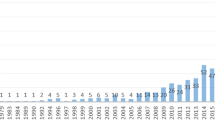Abstract
An overview of the application of linked open data technologies in foreign projects in the field of digital humanities is provided. In this field, several directions can be distinguished: the transformation of digital collections of culture and art into linked open data, the integration of heterogeneous data related to an event, bibliographic resources, language information resources, and musical and musicological data. The most valuable type of linked data projects are technological developments and infrastructure projects that create the basis for national systems of digital humanities. The role of ontology in the implementation of linked data projects is emphasized.
Similar content being viewed by others
REFERENCES
Antopol’skii, A.B. and Efremenko, D.V., Infosfera obshchestvennykh nauk Rossii. Monographiya (Infosphere of Social Sciences in Russia: Monograph), Tsvetkova, V.A., Ed., Moscow: Direkt-Media, 2017. https://doi.org/10.23681/468227
Antopol’skii, A.B., Infosphere of digital humanities: Experience of analysis, Inf. Resursy Rossii, 2022, no. 1, pp. 30–38.
Linked Open Data Infrastructure for Digital Humanities in Finland (LODI4DH). https://seco.cs.aalto.fi/projects/lodi4dh/.
Linked Infrastructure for Networked Cultural Scholarship. https://lincsproject.ca/.
CoDHR. http://codhr.dh.tamu.edu/2018/04/24/ linked-infrastructure-for-networked-cultural-scholarship-lincs.
JSON-LD 1.1 A JSON-based serialization for linked data. Draft community group report 19 April 2019. https://json-ld.org/spec/latest/json-ld/.
JSON-LD Working Group. https://www.w3.org/ 2018/json-ld-wg/.
Live on LodLive. http://en.lodlive.it/.
ELTEdata-project. https://eltedata.elte-dh.hu/wiki/ Main_Page.
LIDER: FP Linked Data as an enabler of cross-media and multilingual content analytics for enterprises across Europe FP7-610782D3. https://docplayer.net/13943-2478-Lider-fp-linked-data-as-an-enabler-of-cross-media-and-multilingual-content-analytics-for-enterprises-across-europe.html.
ModRef project: Modeling, references, digital culture. http://modref-labexpassespresent.huma-num.fr/ModRef/.
Labex past in present: History, heritage, remembrance – Labex Les Passés dans le Présent: histoire, patrimoine, mémoires. http://passes-present.eu/.
MoDyCo. http://www.modyco.fr/fr/.
Bibliothèque de la Documentation Internationale Contemporaine. http://www.bdic.fr/.
Maison de L’Archéologie et de L’Ethnologie. http://www.mae.u-paris10.fr/.
Archéologies et Sciences de l’Antiquité (ArScAn). http://www.arscan.fr/.
CIDOC-CRM. http://www.cidoc-crm.org.
The Erlangen CRM/OWL. http://www.erlangen-crm.org/.
The British Museum. Explore the collection. https://www.britishmuseum.org/collection.
Yale Center for British Art. https://britishart.yale.edu/collections/using-collections/technology/linked-open-data.
The Getti Conservation Institute Arches Project. http://www.getty.edu/conservation/our_projects/field_pro-jects/arches.
Biblissima, the Observatory for Medieval and Renaissance Written Cultural Heritage. https://biblissima.fr.
DBPedia. http://www.dbpedia.org/sparql.
NAKALA. https://www.nakala.fr/about.
SyMoGIH project. http://www.symogih.org/.
PHAROS. http://pharosartresearch.org/.
The Zeri & LODE project. http://data.fondazionezeri.unibo.it/.
Antopol’skii, A.B. and Markarova, T.S., Integration of library and archive information systems. https://rucont.ru/efd/158.
The Stanford Prison Experiment on LOD. https://spelod.github.io/#erModel.
Seeing Standards: A Visualization of the Metadata Universe. http://jennriley.com/metadatamap/.
Linked Open Vocabularies (LOV). https://lov.linkeddata.es/dataset/lov.
Woodstock Music and Art Festival. https://woodslod.github.io/woodsLOD/.
WarSampo Finnish World War II on the Semantic Web. https://www.sotasampo.fi/en/.
Battle of the WaterLOD. https://waterlod.github.io/index.html.
The Kon-Tiki Expedition. A Linked Open Data project. https://kontikilod.github.io/KonTiki/.
La Dolce Vita - Linked Open Data. https://fellini-lod.github.io/contenuto.html.
Patrick aLOuD. https://patrickaloud.github.io/.
The INKING of RMS Titanic. https://linkingoftitanic.wixsite.com/linkingtitanic.
Martrioska. https://martrioska.github.io/martrioska. html.
Bibliographic Framework Model. https://www.loc. gov/bibframe/.
IFLA Library Reference Model. https://www.librarianshipstudies.com/2020/04/ifla-library-reference-model-lrm.html.
Online Computer Library Center. https://www.oclc. org/en/home.html?Redirect =true.
Linked Data Survey results 6 – Advice from the implementers. https://hangingtogether.org/linked-data-survey-results-6-advice-from-the-implementers/.
Smith-Yoshimura, K., Linked data implementations – Who, what, why?. https://www.oclc.org/content/dam/research/events/2018/smith-yoshimura-lnked-data-implementations-who-whatwhy-SWIB18.pptx.
Bahnemann, G., Carroll, M., Clough, P., Einaudi, M., Ewing, Ch., Mixter, J., Roy, J., Tomren, H., Washburn, B., and Williams, E., Transforming metadata into linked data to improve digital collection discoverability: A CONTENTdm pilot project, Dublin, Ohio: OCLC Research, 2021. https://doi.org/10.25333/fzcv-0851
Linked Open Data. Classification system of knowledge organization. https://lod.rsl.ru/.
Zhlobinskaya, O.N., Library linked data: Analysis of foreign experience. http://www.nilc.ru/text/NMLBD/ NMLBD4.pdf.
Zhlobinskaya, O.N., Representation of library data in LOD: Capabilities and prospects of RUSMARC format. http://www.rusmarc.ru/publish/%D0%92%D0%BE%-D0%B7%D0%BC%D0%BE%D0%B6%D0%BD%D0%BE%D1%81%D1%82%D0%B8%20%D0%B8%20%D0%BF%D0%B5%D1%80%D1%81%D0%BF%D0%B5%D0%BA%D1%82%D0%B8%D0%B2%D1%8B%20RUSMARC_%D0%A0%D0%BE%D1%81%-D1%82%D0%BE%D0%B2.pdf.
Cimiano, Ph., Chiarcos, Ch., McCrae, J.P., and Gracia, J., Linguistic Linked Data: Representation, Generation and Applications, Cham: Springer, 2020. https://doi.org/10.1007/978-3-030-30225-2
Antopol’skii, A.B., Linguistic linked open data: State-of-the-art and perspectives, Nauchn.-Tekhn. Inform., Ser. 2. Protsessy Sist., 2021, no. 8, pp. 28–36.
Linguistic linked open data, http://linguistic-lod.org/.
Cross-linguistic data formats. https://cldf.clld.org/.
The Prêt-à-LLOD Project. https://pret-a-llod.github.io/.
CLLD – Cross-linguistic linked data. https://clld.org/.
Linked open dictionaries. http://ionov.me/liodi/.
Workshop on Linked Data in Linguistics (LDL). https://www.aclweb.org/anthology/venues/ldl/.
CoNLL-RDF: Linked corpora done in an NLP-friendly way. https://www.researchgate.net/publication/318134320_ CoNLL-RDF_Linked_Corpora_Done_ in_an_NLP-Friendly_Way.
Lexvo.org. http://www.lexvo.org.
Getty vocabularies as linked open data. http://www.getty.edu/research/tools/vocabularies/lod/index.html#defi-nition.
Ustalov, D.A., Thesauruses of Russian language in the form of linked open data. https://www.dialog-21.ru/media/1103/ustalovda.pdf.
Graph embedding and link prediction starting from a non-linked musical dataset. https://alerosae.github. io/FromRaw2Linked/.
DBpedia. Global and unified access to knowledge graphs. https://www.dbpedia.org/.
JazzCats (Jazz Collection of Aggregated Triples). https://jazzcats.cdhr.anu.edu.au/.
Author information
Authors and Affiliations
Corresponding author
Ethics declarations
The author declares that he has no conflicts of interest.
Additional information
Translated by E. Oborin
About this article
Cite this article
Antopolsky, A.B. Linked Open Data in the Digital Humanities (Review of Publications). Sci. Tech. Inf. Proc. 49, 119–126 (2022). https://doi.org/10.3103/S014768822202006X
Received:
Published:
Issue Date:
DOI: https://doi.org/10.3103/S014768822202006X




